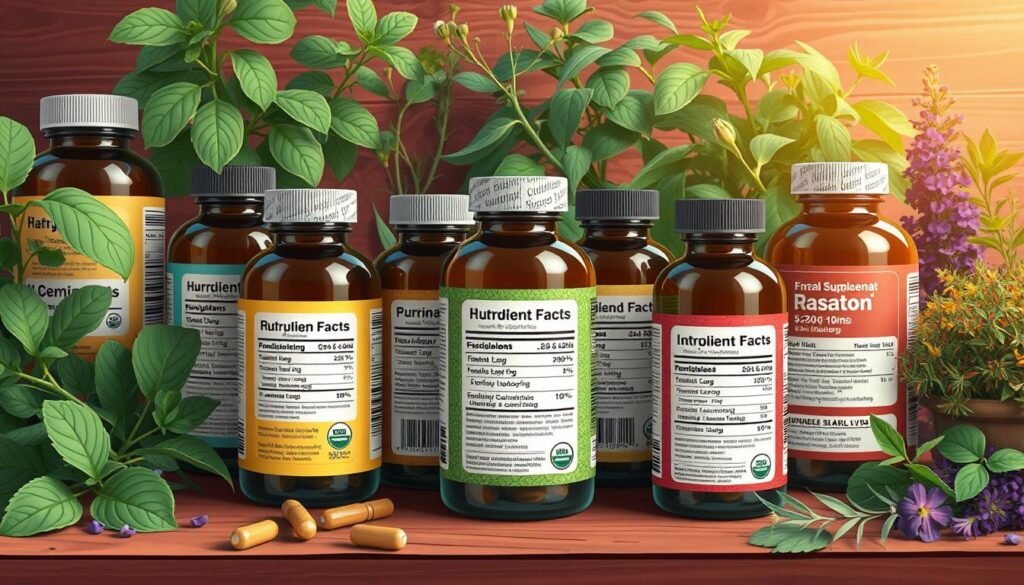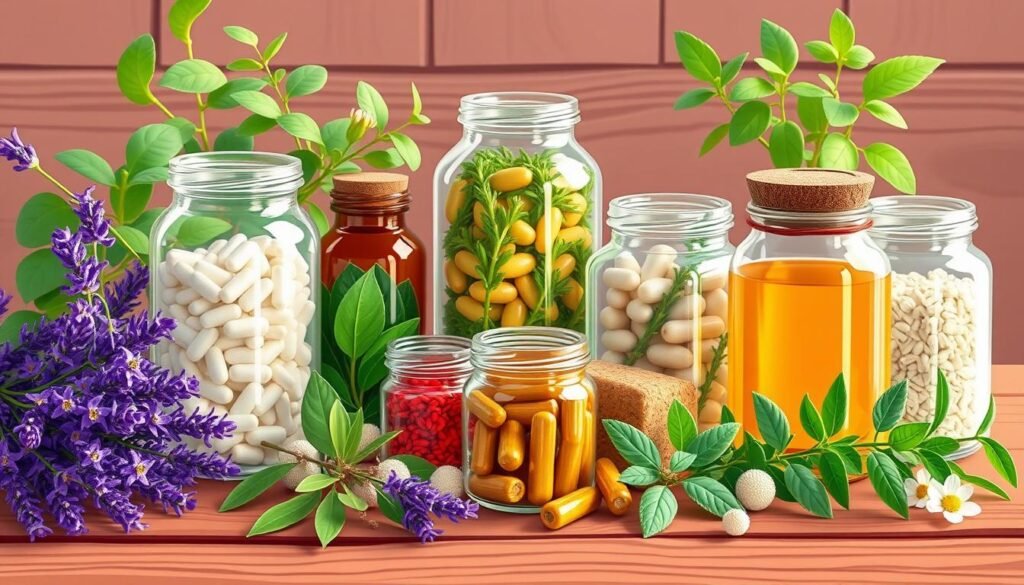Did you know one-third of essential oils might cause allergies? This is often due to unwanted substances or changes. The herbal remedies industry makes about $60 billion a year. Clearly, lots of people are choosing natural medicine for health answers. However, knowing how to safely use natural supplements is key. This ensures the safety of herbal remedies and lowers the risks of alternative medicine.
Finding your way through herbal medicines can be tricky. But learning the necessary precautions makes usage safer. It also helps when working with doctors. Knowing that natural supplements can affect regular medicines is crucial. This highlights why making informed choices is important before using these remedies for health.
Key Takeaways
- One-third of essential oils may cause allergic reactions.
- Natural supplements can interact with conventional medications.
- Professional guidance is essential when using herbal remedies.
- Proper dosage and administration are critical for safety.
- Some natural substances can lead to severe allergic reactions.
Understanding Herbal Supplements
Herbal supplements are products from plants that promise health benefits. They come in forms like teas, capsules, and tinctures. About 88% of nations use herbal medicine, showing its worldwide importance. In the U.S., a 2017 American Family Physician review found that 40-60% of adults take dietary supplements, which includes herbs.
The use of herbal supplements has grown for several reasons. People are looking for natural options and are sometimes unhappy with the cost of regular medicines. It’s been reported that 25% mix herbs with their prescribed drugs. This brings up natural remedies warnings about possible harmful interactions.
It’s critical to follow guidelines on botanical medicine. Echinacea, for example, can help reduce colds in both frequency and length. St. John’s wort is praised for helping with depression. Although these are often seen as safe, they can interact with other medications. St. John’s wort, for instance, can make you more sensitive to the sun and change how certain drugs work.
People older than 70 and those with more education are often drawn to herbal remedies. They especially look to them when considering over-the-counter options. In Germany, doctors prescribe 600 to 700 plant-based medicines. This shows how deeply herbal supplements are woven into healthcare there.
| Herbal Supplement | Common Use | Potential Interaction | Safety Considerations |
|---|---|---|---|
| Echinacea | Cold prevention | Might reduce the effectiveness of immunosuppressive drugs | Generally considered safe |
| St. John’s Wort | Depression treatment | Interferes with antidepressants and birth control pills | May increase sun sensitivity |
| Saw Palmetto | BPH treatment | May interact with blood thinners | Usually regarded as safe |
| Valerian | Sleep aid | Enhanced sedative effects with other sleep medications | Considered a safe alternative |
It’s key for those thinking about using herbal remedies to know the risks and benefits. By following trusted guidelines and understanding the effects, individuals can choose wisely about their health.
The Role of the FDA in Herbal Medicines
The FDA has a big role in supervising herbal products. They see these items as dietary supplements, not drugs. This means they don’t need to check them like medicines. So, many herbal products can be sold without proving they are safe or work.
But, the FDA steps in if a product is not safe or is wrongly labeled. Still, there’s not much scientific proof that these herbs work. This worries people about the safety of alternative medicine. Plus, some herbs can cause bad reactions or affect other medicines you take. Knowing these traditional medicine precautions is key to being safe.
If you’re thinking about trying herbal remedies, talk to a doctor first. They know about the latest research. They can tell you how herbs might interact with your current medicines. With good advice, you can safely see if herbal treatments help you.
Precautions When Using Natural Medicine
Natural medicine has many benefits, but safety is key. It’s vital to get advice from professionals when using supplements. This ensures the advice fits your needs and checks for drug interactions.
Importance of Professional Guidance
If you have health issues or are in treatment, seeking professional advice is a must. Herbal remedies are complex. Understanding them fully is necessary to avoid harmful effects. Don’t self-prescribe. It may cause issues or lessen the effectiveness of your prescriptions. Herbal remedies should be in line with your doctor’s advice.
Understanding Dosage and Administration
Correct dosage is important for the safe use of herbal supplements. Different products have varying strengths. It’s crucial to follow the label and talk to healthcare experts about dosage. This approach reduces risks and enhances the benefits of the supplements.
To make wise choices, know how herbal medicine and traditional treatments interact. For those aiming to improve their health through diet, personalized nutrition plans offer extra help towards recovery and wellness.
Common Types of Herbal Remedies
Herbal remedies are a key part of traditions all over the world. They play a big role in various types of traditional medicine. It’s good to know the most common herbal supplements and what they do for health. Many people choose these natural options to help with certain health issues. But, it’s just as important to know about any possible side effects from natural medicines.
Popular Herbal Supplements and Their Uses
Here are some herbal remedies well-known for their health benefits:
- St. John’s Wort: Mainly helps improve mood and fights depression.
- Echinacea: Used to boost the immune system’s health.
- Garlic: Helps with heart health and circulation.
About 12.8% of adults in the United States use at least one herbal product. This shows that more people are recognizing the value of these remedies in healthcare.
Potential Side Effects of Common Herbal Remedies
Even though herbal remedies can be beneficial, they can also have side effects. These side effects might be minor or very serious. It’s important to be careful when using herbal supplements:
- St. John’s Wort may not work well with some prescription drugs, like those for depression.
- Black cohosh could cause liver problems or increase liver enzyme levels.
- Chamomile might cause allergic reactions in some people, especially if they’re allergic to ragweed.
It’s wise to talk to healthcare providers about these remedies. They can tell you how to use them safely and effectively. This careful approach can help you make the most of herbal supplements for your health.
Interactions Between Herbal Supplements and Conventional Medications
Herbal supplements are getting more popular for their health benefits. But they may interfere with other medicines you’re taking. This could make your medicine less effective or cause more side effects. It’s important to know about these risks.
St. John’s wort, for example, affects many drugs like antidepressants and blood thinners. Taking it may lower how well these medications work and could lead to problems. Mixing herbal remedies and medications without knowing how they interact can be dangerous.
Some known interactions include:
- Cat’s claw might change the effects of blood thinners, blood pressure meds, and immune system drugs.
- Ginkgo biloba could cause more bleeding if taken with warfarin or aspirin.
- Chamomile may make birth control pills work less effectively.
- High doses of green tea might reduce how well some drugs, like atorvastatin, work.
Research suggests only 70% of folks tell their doctors about using herbal supplements. Not sharing this can make treating them harder and increase alternative medicine risks. It’s critical to be open about all substances you’re using to stay safe.
| Herbal Supplement | Interactions | Health Risks |
|---|---|---|
| St. John’s Wort | Antidepressants, Coumadin, HIV medications | Diminished medication effectiveness, increased bleeding risk |
| Ginkgo Biloba | Aspirin, Warfarin | Increased risk of spontaneous bleeding |
| Cat’s Claw | Calcium channel blockers, Hypertensive drugs | Adverse cardiovascular effects |
| Chamomile | Oral contraceptives | Reduced contraceptive effectiveness |
So, if you’re thinking about using herbal supplements and are on medications, talk openly with your doctor. Knowing how herbal remedies and medications interact can help avoid health issues. This way, treatments can be safer for everyone involved.
The Importance of Label Transparency
Label transparency is very important in the natural remedies world. It ensures consumer safety and helps people make informed choices. The demand for herbal supplements is growing. This makes it vital that these products are clearly labeled. They should list ingredients and any safety warnings associated with the product.
Key Information Found on Supplement Labels
Good herbal supplement labeling includes several key details. It should have clear dosage instructions and list potential allergens. This helps consumers make smart choices. Recently, health groups have asked for more transparency in herbal products. They want to stop the sale of low-quality and fake products.
- Product Identification: Clearly stating what the product is.
- Usage Instructions: Guidelines for correct consumption.
- Warning Statements: Alerts about potential side effects.
- Nutritional Information: Comprehensive details about ingredient composition.
Clear labels are now more important than ever in the health supplement world. They show a brand’s commitment to keeping consumers safe and well-informed. If you’re considering herbal supplements, always choose those with clear labels. Companies making and selling these products must follow strict rules. This ensures their products are safe and helpful to consumers.
Transparent natural remedies warning labels build trust and loyalty with customers. Today, people want to know exactly what’s in the products they use. Following these labeling principles helps brands stay credible and satisfy consumers. Learn more about the importance of clean labeling for nutraceuticals and health supplements here.

Considerations for Specific Populations
Certain groups need to be extra careful with herbal remedies. These include pregnant or breastfeeding women, older adults, and children. Their health needs and risks with herbal products make it important to be cautious.
Pregnant or Breastfeeding Women
The safety of herbal medicine for pregnant women is a big worry. These supplements can affect a baby’s development or breastfeeding. There’s not much info on the safety of these products during pregnancy. It’s critical for pregnant women to talk with doctors before using herbal remedies. For more details about how allergies affect breathing, check here.
Older Adults and Children
Older adults must be cautious with herbal supplements due to many medications they might be taking. These medications can mix badly with herbal products. This can lead to different effects and sometimes harm. Also, kids need special attention with herbal remedies. Parents must make sure the remedies are right for their children’s age and growing bodies.
| Population | Considerations | Recommendations |
|---|---|---|
| Pregnant Women | Limited research on safety of many herbal products | Consult healthcare providers before use |
| Elderly | Risk of interactions with multiple medications | Discuss herbal supplementation with doctors |
| Children | Differences in metabolism and dosage requirements | Use age-appropriate formulations |
Recognizing Adverse Reactions
Knowing the bad reactions to herbal supplements is crucial. Effects can be minor or severe, like nausea, dizziness, rashes, and sometimes, life-threatening allergic reactions. Spotting these side effects quickly helps use herbs safely and effectively.
Watch how your body reacts when you start a new supplement. If symptoms get worse or new ones appear, get medical help right away. Before using herbs, learn about their possible bad reactions. This makes it easier to deal with any issues early on.
A lot of adults with long-term illnesses choose dietary supplements. At the same time, many who take prescription drugs also use these supplements. Knowing how herbs might react with other treatments is key to keeping patients safe.

Herbs like black cohosh, cranberry, and ginkgo usually don’t mix badly with drugs. But, St. John’s wort and goldenseal might not work well with other medicines. They can also affect how drugs are broken down in the liver. So, it’s important to know the risks of each herb to make good health choices.
By staying alert and informed, you can safely enjoy the benefits of supplements. This reduces the chances of having bad reactions to the herbs you take.
Choosing Reputable Manufacturers
It’s key to pick high-quality herbal supplements. With so many choices, buyers need to find trustworthy brands. This ensures safety and effectiveness. Look for companies known for being open and thorough in their testing.
Evaluating Herbal Supplement Quality
Several important factors come into play when finding reliable herbal products:
- Reputation: Search for brands that get good reviews and keep their customers happy. Companies that are open about their practices are usually more reliable.
- Third-party testing: A seal from an independent lab means the product was closely examined. It shows that what’s on the label is what’s inside.
- Transparency: Companies that tell you where and how they get and test their ingredients are more trustworthy. They should let you know all about their ingredients and how they extract them.
- Ingredient disclosures: Products should list all ingredients clearly. This includes what’s active in them and how much is there. This helps confirm the claims the company makes.
For an herbal remedy to be worthwhile, it must meet quality standards. The role of clinical trials is vital as they prove a product’s dependability. Also, it’s important that extracts are made consistently. This ensures that every batch works the same, which is key for those who want effective supplements.
Complementary Therapy Considerations
Exploring complementary therapy alongside traditional medical care is important. Many people use herbal supplements to feel better during tough treatments like chemotherapy. It’s crucial to talk with healthcare professionals. They offer important advice on holistic treatment precautions. This ensures benefits are maximized while risks are minimized.
Integrative medicine blends conventional and complementary therapies, focusing on what the patient prefers for their health. Practices like meditation and yoga help with relaxation and improving well-being. Adding natural substances and dietary changes also helps in a holistic health plan.
While complementary therapies offer benefits, safety is a top priority. Some herbal supplements might not mix well with other medicines. This can cause bad reactions. Always tell healthcare providers about any supplements you’re taking. This helps in planning safe and effective treatment strategies. Combining professional guidance with personal health beliefs leads to a better therapy experience.

Conclusion
Interest in natural medicine is growing fast. It’s vital to use herbal supplements carefully and with knowledge. To be safe, we need to think about how herbs might react with medicine, learn the right doses, and seek advice from experts. More than 80% of people worldwide use herbs for health. It’s important to navigate this area wisely to get the benefits without the risks.
When taking natural medicines, it’s key to watch out for bad reactions. Talking openly with healthcare providers is crucial. This way, people using herbs can make choices that are good for their own health situations. This makes personal use safer and builds a community that knows a lot about using herbs well.
The path to using herbal supplements well relies on learning, being open, and understanding natural medicine’s complexities. If we focus on staying safe and making informed choices, we can really make the most of what herbs offer. This helps us keep our health protected.